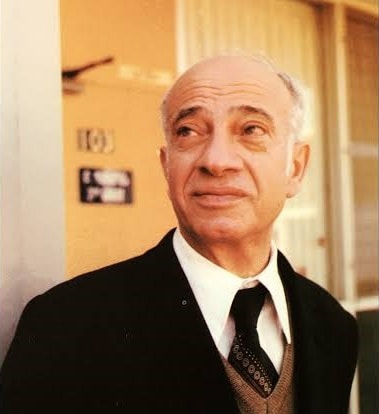Moushegh Ishkhan was one of the most relevant names in Diaspora poetry in the 1940s-1960s and his decades-long work as a teacher forged generations of students.
Moushegh Djenderedjian was born in Sivri Hisar, near Ankara, in 1913. He was exiled with his family in 1915. He managed to survive the Armenian Genocide and finally settled in Damascus. His life changed upon a chance meeting with a teacher while he was struggling to make a living. As he famously said, “Instead of becoming a shoemaker, I became an educator.” Following his graduation from the local elementary school, he left for Cyprus. He completed two years of study at the Melkonian Educational Institute, where he was a student of Hagop Oshagan. He moved to Beirut in 1930 and graduated in 1935 from the Armenian College (the future Nshan Palandjian and then Melanchton and Haig Arslanian College) of Hamazkayin, where he taught for three years. He adopted the pen name Moushegh Ishkhan and published his first collection of literature. He took literature and pedagogy courses at the University of Brussels (Belgium) from 1938 to–1940 but did not conclude his studies due to the war. He returned to Beirut and worked as a lecturer in literature at
Palandjian College until his retirement. At one point, he simultaneously served as editor of both the daily and weekly editions of Aztag. He passed away on June 12, 1990, in Beirut.
Ishkhan’s quest for a home and his dream of a homeland fueled his writing. He became one of the foremost poets of his generation. Some titles of his books of poetry, like The Song of the Houses (1936), Life and Dream (1949), and his novels For Bread and Light (1951) and For Bread and Love (1956), as well as his poem Armenia (1946), are suggestive in this sense. In a famous poem, he depicted the Armenian language as the “haven where the wanderer can own roof and wall and nourishment,” while Armenia is “the only true fairy-tale,” “a huge sun-cast bell that tolls from the dome of the universe.” He also penned other collections of poetry, entitled Golden Autumn (1963), Suffering (1968), Sunset (1986), and Twilight under the Bombs (published posthumously in 1991), and of prose (The Wait, 1976).
Moushegh Ishkhan also wrote several volumes of plays: It Is So Difficult to Die (1971), The Man from the Refrigerator (1979), and Plays (1980), as well as the memoirs Farewell, Childhood (1974) and My Teachers (1984). His three-volume textbook Modern Armenian Literature (1973-1975) has been a standard resource for high school students.
After the independence, a school was named after him in Yerevan.

